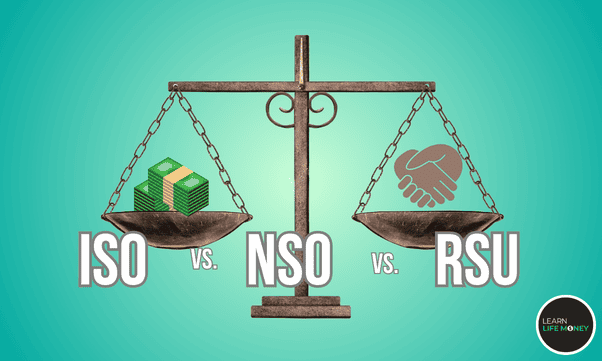
ISO vs. NSO vs. RSU

Let’s start off easy: these letters all stand for different types of equity compensation that give you a chance to own a percentage of the company. They’re Incentive Stock Options (ISO), Non-Qualified Stock Options (NSO), and Restricted Stock Units (RSU).
The thing is, I’ve been itching to talk about this for a while now. It’s funny how often people ask me about the difference between ISOs, NSOs, and RSUs. So, why not answer it here?
If you’re part of a company, especially a startup, these might just become your new BFFs.
You see, about 1 in 3 decision-makers in the US alone are planning to strengthen their equity compensation programs. But why?
Well, they’re relying on this form of compensation not only to attract but also to retain talent.
And for the employees, it’s a way to benefit directly from the success of the company.
It’s as they always say, “A rising tide lifts all boats.”
But just like most things in life, not all equity is created equal. To maximize these perks, it’s vital to have a deeper understanding of how these investments work.
From ISO to RSU, we’re going to dive into the deep end of equity compensation.
What Is Equity Compensation?

Equity compensation is a non-cash payment that a company offers to its employees, executives, and contractors.
This type of benefit is quite common in the world of startups, technology companies, and companies in their growth phase.
Instead of paying out large salaries upfront, companies share a fraction of their ownership through stocks, options, and other forms of equity.
With this, they offer a piece of the pie (the pie is the company). The size and worth of that piece depend on the success of the company.
This ties the interests of the employee to the company’s goals, encouraging them to work toward increasing the company’s and, in turn, their own value.
Equity compensation, therefore, manifests as shares of company stock, stock options, restricted stock, and performance shares, among others.
Why Do Companies Offer Equity Compensation?

Now, you might wonder: why do companies decide to divide their ownership this way? There are a few key reasons to consider.
First, startups and growing companies often face a cash crunch. They need to maintain liquidity to invest in the growth, development, and day-to-day expenses of their business.
Paying out enormous salaries might not be possible for them.
Offering equity compensation allows these companies to attract and retain top talent without bleeding their cash reserves dry.
Second, equity compensation creates a sense of ownership among the employees.
When an employee owns a part of the company, their priorities align with its growth and success. This can lead to higher motivation levels, better productivity, and improved loyalty.
Last, it’s about sharing the potential upside.
If the company does well, everyone’s part of the success; the employees’ equity stakes or options could be worth a lot.
Sharing this potential upside creates a strong incentive for professionals to join a startup or stick with a company through its growth phase.
Incentive Stock Options (ISOs)

Now that you know the basics, let’s start with ISOs.
Incentive Stock Options (ISOs) can be quite mystifying for many, but they’re an important part of the equity compensation mix.
When a company is in its growth phase or is looking to attract valued employees, offering ISOs can be a highly compelling strategy.
So, let’s strip this down to its basics and help you understand why ISOs might just be your new best friend.
The Basics of ISOs
ISOs are an opportunity for employees to purchase company stock at a predetermined stock price.
This price, called the ‘strike price,’ remains fixed even if the value of the company stock increases in the future (which is the entire aim).
ISOs work like this: you’re given the option to buy, say, 1,000 shares of your company’s stock at $10 per share.
If the share value appreciates to $20 each at a future date, and you decide to buy at the $10 stock price point you initially got, you’ll make a considerable profit.
The time frame for buying these shares at the ‘strike price’ is known as the ‘exercise period.’
Sounds advantageous? That’s because it is!
Advantages of ISO on Taxes
ISOs have great advantages when it comes to paying taxes.
Tax Implications of ISOs
One of the significant advantages that employees love about ISOs is the friendly tax implications.
Yes, even the IRS understands how awesome ISOs are!
Unlike non-qualified stock options, ISOs offer tax benefits if you meet specific criteria.
Also, the alternative minimum tax is applicable here.
ISO Exercise and Income tax
The key feature of ISOs is that, with ISOs, there’s no income tax due at exercise.
That’s right, you heard it. The spread (difference between market value and your strike price at exercise) isn’t taxed!
ISO Sales and Capital Gains Tax
When you sell your ISO shares, the profit is considered a long-term capital gain if you meet both the holding period requirements.
Generally, these tax rates are lower than ordinary income tax rates, which is a win for employees.
ISO and Company Requirements
While the tax implications make ISOs quite appealing to employees, there are company requirements to keep in mind that govern the ISO realm.
For instance, your employer needs to grant the ISOs under a written plan, which the shareholders must approve.
Additionally, the plan must detail the total number of shares that can be issued as ISOs and identify the employees who are eligible to receive them.
Also, the alternative minimum tax will apply if the fair market value of the stock is comparably higher than the exercise price.
Non-Qualified Stock Options (NSOs)

This is also the same with ISOS, but they differ in how they’re taxed.
Understanding NSOs
NSOs, like Incentive Stock Options (ISOs), allow employees to buy company shares at a predetermined stock price (strike price), regardless of any future escalation in their market value.
The significant difference is that NSOs do not meet certain IRS requirements that provide a tax benefit, hence the adjective ‘non-qualified.’
This, however, doesn’t make them any less attractive or valuable.
NSOs offer their unique set of advantages, opening up possibilities that might be constricted by the stringent stipulations associated with ISOs.
The Differences Between ISOs and NSOs
Here are some differences between ISOs and NSOs.
Tax Treatment
One of the pivotal factors differentiating ISOs from NSOs is the tax treatment.
With NSOs, the bargain element (difference between market value and strike price at exercise) is generally taxed as ordinary income right when you exercise them.
Eligibility
While ISOs are strictly reserved for employees, NSOs provide more flexibility.
They can be issued not only to employees but to contractors, consultants, board members, and anyone else involved with the company.
This aspect makes NSOs a versatile equity compensation tool.
Exercise Price
ISOs typically need to be priced at the current market value of the company’s stock, while NSOs can be offered at less than market value.
However, granting NSOs below market value can have tax implications and is usually not recommended.
Tax Implications of NSOs
When you exercise NSOs, you are required to pay income tax on the difference between the exercise price and the current market value.
This is taxed at the ordinary income tax rate.
When you sell the shares, any further gains (or losses) are treated as capital gains (or losses), which could either be long-term or short-term, depending on the holding period of actual shares.
NSOs, therefore, while missing out on some tax advantages, present their unique set of benefits alongside.
Restricted Stock Units (RSUs)

Of the two I’ve discussed here so far, this one, Restricted Stock Units (RSUs), is the least known.
But, keep in mind, it doesn’t mean that it’s not used at all. I mean, it exists for a reason.
So, who uses RSUs?
Well, they’re quite popular with big public companies because they offer quite an advantage not just to the employer but also to the employee.
You’ll also be shocked once you know that RSUs are quite simpler compared to the two.
How RSUs Work for Employees
You see, just ISOs and NSOs, RSUs function the same, but there’s a need to complete a vesting period.
It’s like promising employees that they’ll be given appropriate compensation (either monetary or company shares) at a predetermined future time.
While the vesting period is ongoing, they don’t have the right to stock ownership and can’t exercise voting privileges.
What’s exciting about this? It’s the fact that you, the employee, won’t be buying anything at all, even paying an exercise price.
So, it’ll be yours once it has vested. You do whatever you want with it right after.
However, keep in mind that RSUs and PSUs (Performance Stock Units) are treated differently.
Tax Implications of RSUs
There are also tax implications for RSUs.
RSUs and Income Tax
When you receive your RSUs, they’ll be automatically considered income.
Thus in the tax bill, income tax will be deducted accordingly.
The overall valuation of your RSUs will be combined with your taxable income per year.
RSU Sales and Capital Gains Tax
Once your RSUs have vested and you suddenly decide to sell your shares, the difference between the sale price and the value used for income tax calculation will be considered a capital gain (or loss).
So, if you have retained the shares for more than one year from the vesting date, it will be regarded as a long-term capital gain (or loss), which could have a lower tax rate.
If you sell the shares within one year of the vesting date, it will be treated as a short-term capital gain (or loss) and subject to a potentially higher tax rate.
RSU Vesting Schedules
Employers typically structure RSU awards with vesting schedules that help retain employees and incentivize loyalty.
These schedules can follow different patterns like a “cliff” (vesting occurs at once after a set period), “graded” (vesting occurs in installments over time), or “performance-based” (vesting tied to achievement of specific performance goals).
Understanding how these vesting schedules work will help you plan your tax liabilities more effectively.

Final Thoughts on ISO vs. NSO vs. RSU
As you can see, these three terms (ISOs, NSOs, RSUs) might be difficult to understand on the first try because of their technicalities, but you’ll be able to the more you study about them.
I hope this blog greatly helped you, especially if your company is currently offering an equity compensation plan.
#ISO #NSO #RSU #Types #Equity #Compensation #Explained
RELATED POSTS
View all


